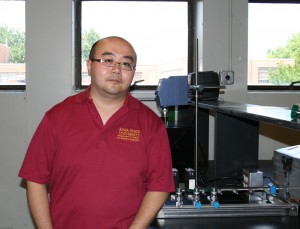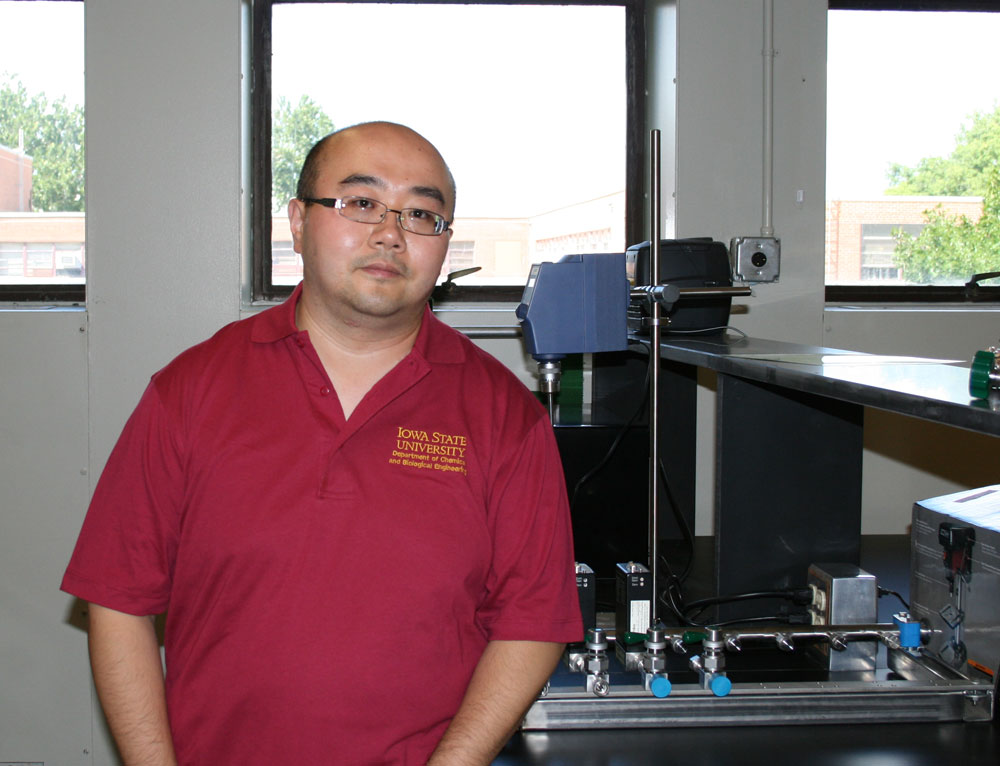Chemical and biological engineering department hires associate professor researching nanomaterials

A small fire on Yue Wu’s apartment balcony when he was a child created a spark in chemistry and research for Wu that has kept burning ever since.
The fire, which he started after trying to make a rocket with different chemicals found in his father’s tool cabinet, was the first of many hands-on experiments for Wu. As he went through high school chemistry class and then to his undergraduate years at the University of Science and Technology of China, Wu knew science was the direction he wanted to go.
Unlike a typical undergraduate student, Wu spent much of his time in the lab, mostly because he really liked to do research. But Wu also hates heat and humidity, and the labs were the only air-conditioned place on campus.
He said, “Whenever I had time, I went to the lab and worked there. That’s why I generated a lot of research results, which further motivated me to pursue a Ph.D. in chemistry.” During his undergraduate program, he published 13 research papers, including one on the Journal of American Chemical Society, which is regarded as the top journal of chemistry.
Wu continued to fulfill his passion and went to Harvard in 2001, where he first became interested in becoming an engineer thanks to his Ph.D. advisor, who always liked to ask the same question for every research project: “What is it good for?”
Wu says, “That perspective switched our research from pure fundamental research to more focused on application. It carried me from Ph.D. research to postdoc research, and even later on, it pushed my work even further towards commercialization when I worked at Purdue as an assistant professor.”
After receiving Ph.D. degree from Harvard in 2006, Wu accepted the Miller fellowship at UC Berkeley, where he worked on nanoparticles in solar cells. When he completed his postdoc research, he accepted a faculty position with the School of Chemical Engineering at Purdue in 2009. He spent five years at Purdue and received an early promotion to tenured associate professor in April 2014.
However, Wu saw a lot of opportunities at Iowa State when he was offered a position, and he recently started as the Herbert Stylus Associate Professor of Chemical and Biological Engineering.
One thing that made him excited to join Iowa State was the U.S. Department of Energy’s Ames Laboratory and research about energy.
With some energy-related research under his belt already from his time at Purdue, Wu is looking forward to working with other faculty interested in the area. “I see a lot of collaboration opportunities with folks in chemical and biological engineering department, chemistry, mechanical engineering, materials science and engineering, physics, and electrical engineering,” he said.
Harvesting waste heat material and developing high-powered safe batteries
Wu’s research focuses on nanomaterials, which are nanometer-sized materials that exhibit unusual electrical properties compared to the regular sized material. Nanomaterials also have unique characteristics, such as significantly decreased thermal conductivity.
His research is broken up into two goals. The first involves creating new semiconductor nanomaterials and molecules to convert waste heat into electricity. Of all the energy we produce in the United States, 58% of it is wasted. Converting even a small amount of this back into energy, “That’s a huge thing for the whole country.”
The second part of Wu’s research group focuses on energy storage, specifically creating nanoparticles that can be used for advanced batteries.
The anode electrode in typical cell phone battery is made from graphite, which can be charged over and over. However, the capacity of the battery is fairly low.
“The material we have developed for the advanced battery has very high capacity, almost four to five times higher capacity [than graphite]. We actually can do a very fast charging/discharging,” he said, adding that the battery could be charged within four minutes.
The advanced battery is also very sustainable, as you can charge it several hundred times without any problem.
In the future, Wu hopes to create a research center focusing on thermal science and technology, including waste heat recovery, solar thermal and thermal storage.
Sharing the knowledge while creating student interest
Wu enjoys research, but he became a professor so he could share the knowledge. “When I see my students be successful, I feel like the knowledge can be passed to the next generation. I try to promote these students to be successful,” he said.
Another important part of being a professor, according to Wu, is to creating student interest in the field. He says developing new technology to compete with the cheap labor and prices from developing countries will be a big part of growing the economy. “We need a larger workforce that is good at doing research to develop new technologies to keep the U.S. economy moving forward.”
Wu has valuable advice for undergraduate students that he looks forward to sharing, “GPA is important, but it is not everything.” While getting his undergraduate degree, he only got a 3.3 GPA, but he spent his time doing valuable research and published 13 research papers.
Wu enjoys spending time with his wife, Bo, and two kids, Sean and Olivia.
